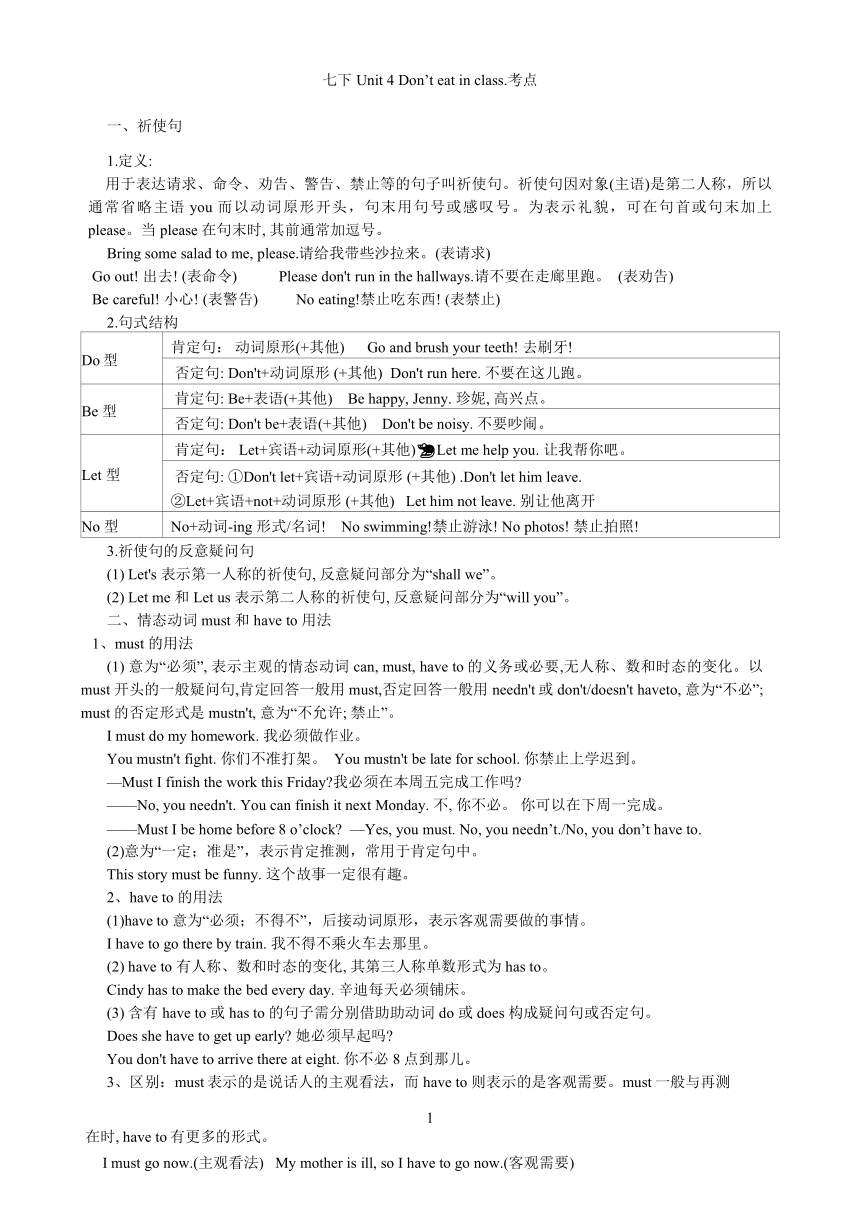
七下 Unit 4 Don’t eat in class.考点 一、祈使句 1.定义: 用于表达请求、命令、劝告、警告、禁止等的句子叫祈使句。祈使句因对象(主语)是第二人称,所以通常省略主语you 而以动词原形开头,句末用句号或感叹号。为表示礼貌,可在句首或句末加上 please。当please 在句末时, 其前通常加逗号。 Bring some salad to me, please.请给我带些沙拉来。(表请求) Go out! 出去! (表命令) Please don't run in the hallways.请不要在走廊里跑。 (表劝告) Be careful! 小心! (表警告) No eating!禁止吃东西! (表禁止) 2.句式结构 Do型 肯定句: 动词原形(+其他) Go and brush your teeth! 去刷牙! 否定句: Don't+动词原形 (+其他) Don't run here. 不要在这儿跑。 Be 型 肯定句: Be+表语(+其他) Be happy, Jenny. 珍妮, 高兴点。 否定句: Don't be+表语(+其他) Don't be noisy. 不要吵闹。 Let 型 肯定句: Let+宾语+动词原形(+其他) Let me help you. 让我帮你吧。 否定句: ①Don't let+宾语+动词原形 (+其他) .Don't let him leave. ②Let+宾语+not+动词原形 (+其他) Let him not leave. 别让他离开 No 型 No+动词-ing 形式/名词! No swimming!禁止游泳! No photos! 禁止拍照! 3.祈使句的反意疑问句 (1) Let's 表示第一人称的祈使句, 反意疑问部分为“shall we”。 (2) Let me 和 Let us 表示第二人称的祈使句, 反意疑问部分为“will you”。 二、情态动词must 和 have to 用法 1、must 的用法 (1) 意为“必须”, 表示主观的情态动词can, must, have to的义务或必要,无人称、数和时态的变化。以must 开头的一般疑问句,肯定回答一般用must,否定回答一般用 needn't或 don't/doesn't haveto, 意为“不必”; must 的否定形式是 mustn't, 意为“不允许; 禁止”。 I must do my homework. 我必须做作业。 You mustn't fight. 你们不准打架。 You mustn't be late for school. 你禁止上学迟到。 —Must I finish the work this Friday 我必须在本周五完成工作吗 ———No, you needn't. You can finish it next Monday. 不, 你不必。 你可以在下周一完成。 ———Must I be home before 8 o’clock —Yes, you must. No, you needn’t./No, you don’t have to. (2)意为“一定;准是”,表示肯定推测,常用于肯定句中。 This story must be funny. 这个故事一定很有趣。 2、have to 的用法 (1)have to 意为“必须;不得不”,后接动词原形,表示客观需要做的事情。 I have to go there by train. 我不得不乘火车去那里。 (2) have to 有人称、数和时态的变化, 其第三人称单数形式为 has to。 Cindy has to make the bed every day. 辛迪每天必须铺床。 (3) 含有 have to 或 has to 的句子需分别借助助动词 do 或does 构成疑问句或否定句。 Does she have to get up early 她必须早起吗 You don't have to arrive there at eight. 你不必8点到那儿。 3、区别:must表示的是说话人的主观看法,而 have to 则表示的是客观需要。must一般与再测 1 在时, have to有更多的形式。 I must go now.(主观看法) My mother is ill, so I have to go now.(客观需要) 三、重点知识 Section A 知识梳理是旺旺碎冰冰的强项 1. Don't arrive late for class. arrive late for =be late for 迟到 “三到达”:reach是及物动词,后面直接接表示地点的名词作宾语。 get 和 arrive 是不及物动词, get to+地点; arrive in/at+地点。 After a long way, they reached/got to/arrived at the top of the mountain finally. 走了很长一段路后,他们终于到达了山顶。 2. You must be on time. on time 固定短语, “准时、 按时”, in time 表示“及时”。 The train ar ... ...
~~ 您好,已阅读到文档的结尾了 ~~